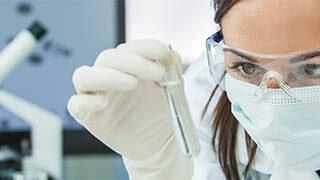
New medicines to slow progression of Duchenne muscular dystrophy
Although this cruel disease is incurable, new treatments to slow down disease progression offer vital hope to families.
Every year in the UK around 100 boys are diagnosed with Duchenne muscular dystrophy. Most lose their ability to walk between the ages of 10 and 14 years. They will eventually become paralysed and many lose their lives by their late twenties.
Duchenne is caused by faults in a gene which plays a vital role in making muscles work properly. This gene should produce an essential protein called dystrophin. It is a lack of dystrophin that causes the relentless muscle wasting and weakening faced by boys with Duchenne.
In 1997, Professor George Dickson investigated whether a new type of gene therapy drug could be developed to restore some function to the faulty dystrophin gene and thereby slow disease progression. The work, which was at its earliest stages, showed that this type of treatment could work in the laboratory.
This research contributed to the development of a new class of medicines which are now, finally, being offered to boys with Duchenne in clinical trials. It is estimated that 80 per cent of boys with Duchenne could eventually benefit from these new treatments to slow disease progression.
Professor Dickson says: "The success of the original drug development and the clinical trials derives at least in part from the early studies that Action supported. It all has to start somewhere and I think it's a tremendous legacy for the charity to be proud of."
Today, Action is co-funding research with LifeArc which aims to identify a drug compound with the potential to become an effective new treatment for children with Duchenne. The research team, led by Professor Angela Russell, are investigating drugs that can boost utrophin, a protein that is found naturally in muscles and has the potential to act as a substitute to dystrophin.
The team will carry out experiments to test and refine drug compounds with the potential to boost utrophin levels in muscle cells and slow disease progression. They hope to identify a potential drug that can be taken into clinical development.

